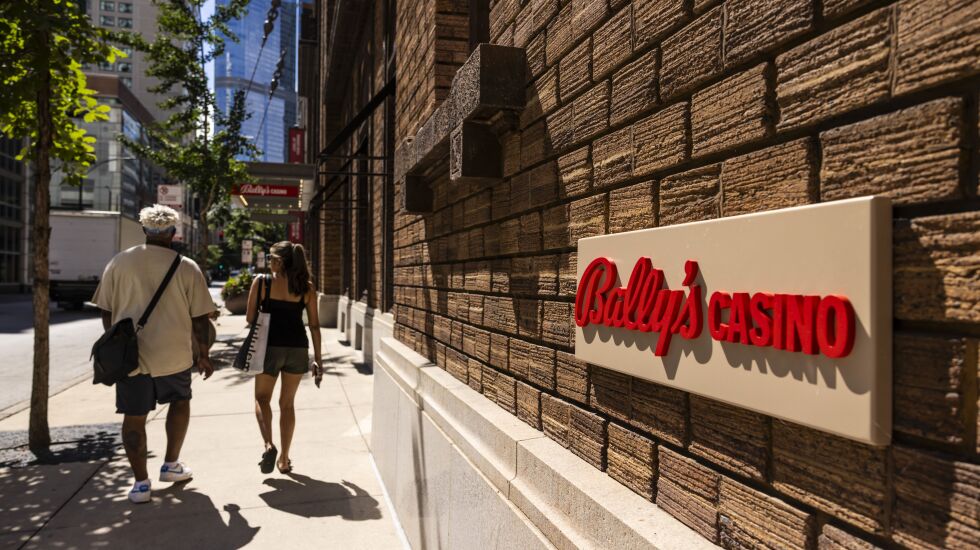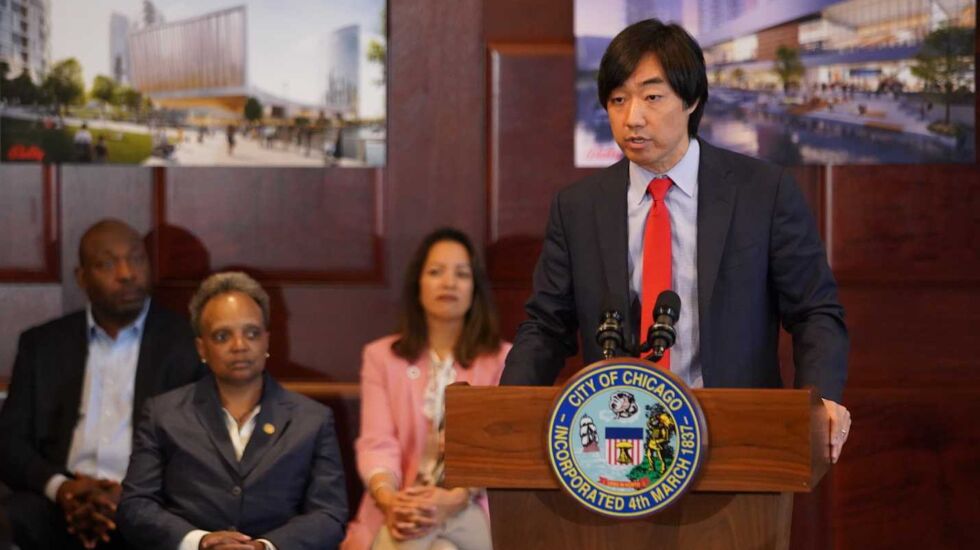Chicago’s casino era begins Saturday.
Bally’s is set to open the city’s first legal casino at 8 a.m. Saturday after getting final approval from state gambling regulators for its temporary operation at the historic Medinah Temple in River North — the precursor to an even larger house of chance slated to open in River West in 2026.
The opening will mark the culmination of decades of political wrangling by former mayors whose Springfield gambits went bust until 2019, when then-Mayor Lori Lightfoot helped throw down the final cards for a 4,000-gaming position mecca in Chicago — the crown jewel of a massive gambling expansion signed into law by Gov. J.B. Pritzker.
That law allows Bally’s to operate for up to three years at a temporary site, which was placed inside Medinah Temple at the behest of city officials, according to Bally’s chairman Soo Kim.
The landmark building has been outfitted with almost 800 slot machines and 56 table games that bettors can sidle up to starting Saturday morning.
Bally’s permanent $1.7 billion casino development, slated to begin construction next summer at Chicago Avenue and Halsted Street, promises to become the largest in a state that already has 15 other casinos in operation, including five in the collar counties and another south suburban emporium expected to open in 2025.
That’s on top of the 8,300-plus bars, restaurants, gas stations and other establishments statewide that carry more than 46,000 slot machines, raising questions about how many more gambling tax dollars can be wrung out of an Illinois market that has more places to legally bet than Nevada does.
For now, officials are only seeing green from the big-city mega-casino, which will first operate in the heart of tourist-heavy River North.

“We would like to thank the Illinois Gaming Board for granting Bally’s the approval to begin welcoming public guests,” the casino’s general manager, Mark Wong, said in a statement. “We look forward to opening our doors and allowing patrons to enjoy every aspect of the latest entertainment destination in this beautiful city.”
An official ribbon-cutting is expected later this month.
Mayor Brandon Johnson’s administration will be the first to reap the financial benefits of the River North emporium at 600 N. Wabash Ave., where city tax revenue is earmarked for its underfunded police and firefighter pensions.
But the Chicago casino saga dates back to 1992, when former Mayor Richard M. Daley — observing freshly legalized riverboat casinos delivering for municipalities in other parts of the state — first said he’d like a casino to start funneling money to the cash-strapped city.
Daley and his eventual successor, Rahm Emanuel, could never bring enough lawmakers to the table in Springfield to authorize a Chicago casino license, leaving it a seemingly unlikely prospect with competing interests elbowing in for pieces of the gambling pie.
Lightfoot finally helped seal the deal in the 2019 gaming expansion, which also introduced five other casinos, a new racetrack license, an expansion of slots outside casinos and the advent of legal sports betting. She had to go back to Springfield for another legislative win the next year, to lower the casino’s 72% tax rate that a state-hired consultant deemed too “onerous” for any developer to make a profit.
Now, the city is banking on up to $50 million per year in tax revenue from the temporary site, and eventually upwards of $200 million from the permanent site, the current location of the Chicago Tribune’s printing press.
State tax dollars will go toward Pritzker’s signature $45 billion capital infrastructure improvement plan.
The remaining windfall goes to Bally’s, which beat out three other development groups for Lightfoot’s nod as the casino operator last spring, including one that included billionaire Rivers Casino chairman Neil Bluhm — whose Des Plaines operation could soon be knocked from its perch as the state’s most lucrative casino.
Lightfoot pushed Bally’s bid through the City Council without any meaningful input from a committee of alderpersons ostensibly formed to handle all matters related to the casino.

And after months of Bally’s telling residents in a series of public meetings that they planned to build a temporary casino on the Tribune site, Kim, the Bally’s chairman, said they would operate at the Medinah Temple instead, despite their preference for the Tribune site.
The building is owned by River North landlord Albert Friedman, whose company is poised to net more than $20 million in rent payments and savings on property taxes. He was also the landlord for Lightfoot’s campaign office.
While the 111-year-old temple will soon become the city’s first state-sanctioned house of chance, Chicago’s history of gambling predates even the historic landmark that Bally’s now calls home.
Chicago’s notorious Levee District thrived along the South Loop lakefront from the 1880s through the early 1910s, a red-light district with brothels and gambling dens run by the Chicago Outfit that kicked back protection money to famously corrupt Alds. “Bathhouse” John Coughlin and “Hinky Dink” Mike Kenna.
Most Levee businesses closed up shop under Mayor Carter Harrison in 1911 — a year before the Medinah Temple was built.







